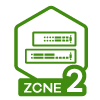Static DHCP Binding Enhancement
 Zyxel Employee
Zyxel Employee



Static DHCP Binding Enhancement
In Nebula 18.00, we have enhanced the static DHCP binding feature to ensure that client devices consistently receive the same IP address, improving network stability and management. This article provides an overview of these enhancements and explains how they benefit both firewalls and security routers.
Overview of Static DHCP Binding
Purpose
Static DHCP binding ensures that a client device, such as a laptop or printer, always receives the same IP address when it connects to the network. This is particularly useful for devices that need to maintain a consistent IP address for various network functions.
Methods for Static DHCP Binding
There are two primary methods to implement static DHCP binding:
- Client Page (Reserve IP Policy)
- Navigate to the client page.
- Select the client device.
- Enable the "Reserve IP" policy to ensure the device always receives the same IP address.
- Interface Page (Static DHCP Table)
- Navigate to the interface page.
- Select the relevant interface.
- Enable the DHCP server and create entries in the static DHCP table by specifying the IP address and MAC address for each client.
Enhancements in Nebula 18.0
Unified Support
Prior to Nebula 18.00, the "Reserve IP Policy" was only available for security routers, while the "Static DHCP Table" was only available for firewalls. In Nebula 18.0:
- Both methods are now available on both security routers and firewalls.
- This ensures consistency and flexibility across different types of security appliances.
Automatic IP Reservation for Policies
When a user selects certain policies such as "Allow" or "Block" for a client, the IP address will now be automatically reserved. This enhancement is crucial because:
- Policy Matching: Security appliance policies require matching both the MAC address and IP address. Without static DHCP binding, if a client's IP address changes, the policies would no longer apply.
- Consistency: Ensures that policies continue to be effective by maintaining the same IP address for the client.
Error Handling
Enhanced error handling has been implemented to prevent conflicts and ensure proper configuration:
- Conflict Checks: When manually adding a client with a reserved IP, the system checks for conflicting IP addresses or MAC addresses and alerts the user if any conflicts are detected.
- Subnet Verification: The system verifies that the specified IP address belongs to an existing subnet within the network configuration, preventing misconfigurations.
Synchronization of Settings
To avoid inconsistencies, changes made through either the client page or the interface page are now synchronized:
- One-to-One Mapping: Any static DHCP binding created on the client page will automatically appear in the static DHCP table on the interface page, and vice versa.
- Description Priority: The client name from the client policy will overwrite the description in the static DHCP table, but the description from the static DHCP table will not overwrite the client name learned by NCC.
Multiple Policies Support
With these enhancements, a client can now have multiple non-exclusive policies:
- For example, a client can be both "Blocked" and have a "Reserved IP".
- This flexibility allows for more granular and effective policy management.
Interface Selection Differences
There is a difference in how firewalls and security routers handle interface selection for client policies:
- Security Routers: Automatically select the interface based on the subnet of the IP address.
- Firewalls: Require manual selection of the interface corresponding to the IP address. This manual selection is necessary due to the higher number of VLANs supported by firewalls, making automatic determination more complex.
Conclusion
The enhancements to static DHCP binding in Nebula 18.0 improve network reliability and management by ensuring consistent IP address assignments for client devices. These updates provide greater flexibility, better error handling, and synchronized settings across different types of security appliances.
Categories
- All Categories
- 442 Beta Program
- 2.9K Nebula
- 213 Nebula Ideas
- 127 Nebula Status and Incidents
- 6.4K Security
- 555 USG FLEX H Series
- 342 Security Ideas
- 1.7K Switch
- 84 Switch Ideas
- 1.4K Wireless
- 52 Wireless Ideas
- 6.9K Consumer Product
- 295 Service & License
- 471 News and Release
- 90 Security Advisories
- 31 Education Center
- 10 [Campaign] Zyxel Network Detective
- 4.7K FAQ
- 34 Documents
- 87 About Community
- 102 Security Highlight